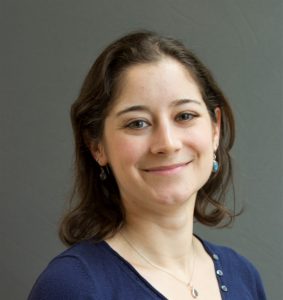Laura Doyle Gauthier, PhD

Current job title: Associate Director of Germline Methods, Data Sciences Platform
Institution: The Broad Institute of Harvard and MIT
Degree, year of completion: B.S. in BME, 2007; PhD in BME, 2013
Why did you choose to attend Johns Hopkins?
I had started doing research in Rai Winslow’s lab as an undergrad.
Can you share any special memories from your time at JHU (in the classroom, lab, etc.)?
At my first poster presentation at my first Biophysical Society conference, I was explaining to a visitor the experimental data that I used to constrain my model when he interrupted me, saying, “Yes, yes, I know. These are my data. Go on.”
I looked at his name tag. Then I looked at the references section on my poster and sure enough it was true. When people come to your poster, always read their name tags.
How did you get interested in your current professional field? What interests or circumstance drew you to it?
I would say that I was gifted with an analytical mind. Biomedical engineering intrigued me beginning in my high school years because it is focused on measuring and describing quantitatively the inherently qualitative and “squishy” aspects of physiology. From a very young age, I wanted to know why things are the way they are and for me the most powerful drive was wanting to understand how the human body works.
Please describe some of your career highlights.
A few years ago I saw a poster at the American Society of Human Genetics conference where the presenter had used the tool I worked on as my first project at my current job. It was exciting to see that something I had worked on was being used “out in the wild”, especially years later. Nowadays I do more management and less programming, but just last week the clinical analysis team in a collaborator’s lab was able to find a genetic diagnosis for a patient based on results from a tool developed by a team I supervise. I feel satisfied that I played a role in enabling that collaboration between our algorithm developers and their analysts to impact the lives of their clinical genetics patients.
What are your most notable/interesting professional (and/or personal) accomplishments?
I’m currently working on a pipeline to jointly analyze 8 petabytes of genomic data. To put that in perspective, 8 petabytes is about 140 million hours of streaming music and more than twice the size of the entire Netflix catalog in 2013.
Do you have any advice to offer aspiring engineers?
Your career path doesn’t have to be a straight line. Sometimes it can feel like one decision will determine your entire future, but that’s almost never true. I know a lot of people who’ve tried a lot of things, taking advantages of opportunities as they arose or making new opportunities. The change can be as simple as taking on a project with a different focus, but it can be enough to set you in a different direction if that’s what you want.
Is there anything else you would like us to know about you?
As part of the development team for the Broad Institute’s Genome Analysis Toolkit I’ve had the opportunity to teach at workshops on three continents. The most unusual was definitely the trip to South Africa, during which I ate antelope, crocodile, and ostrich and I had the opportunity to pet a lion cub.
Do you still feel connected to the Hopkins community? Would you like to be more involved?
I still feel connected to the people I was close to in grad school. Most of us ended up in Boston together!


